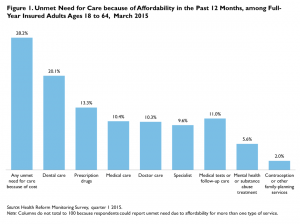Because dental care can be so expensive, it is the number one health care service people skimp on. As a result, people put themselves at serious risk of gum disease, infections, dental pain and tooth loss. In a recent Urban Institute survey, one in five people reported dental needs that they were not addressing. People under 65 are more likely to fill their prescriptions and get medical care than to visit the dentist.
The Urban Institute surveyed 7,500 adults with health insurance about their unmet medical needs.Of the people the Urban Institute surveyed with unmet medical needs, more than seven out of ten (71.4 percent) had an unmet dental need because of the cost. The problem is that health insurance usually does not cover dental care. And, most people do not have a separate dental insurance policy.
Not surprisingly, insured people with lower household incomes are most at risk of not getting dental care, particularly if they don’t have health insurance from their jobs. Almost one in three people with lower incomes and without employer coverage (32 percent)–up to 138 percent of the federal poverty level–reported unmet dental needs because of the cost.
But, many people with higher household incomes also forego needed dental care because of the cost. Almost one in four people with incomes as high as four times the federal poverty level $47,080 without employer coverage (24 percent) also reported foregoing dental care. In contrast, about one in six people (17.3 percent) without employer coverage and incomes above $47,080 said that they needed dental care but could not afford it.
People with employer coverage were somewhat more likely to get dental care than insured people without employer-sponsored coverage. Notably, more than half of employers who offer health coverage (53 percent) offer dental coverage as well.
The Affordable Care Act does not require health plans to offer dental care to adults, only to children. And, only slightly more than half of employers offer dental coverage. Moreover, dental coverage, when available, tends to be limited, requiring people to pay a lot of the cost of serious dental work out of pocket.
Keep in mind that, in some states, Medicaid covers some dental care. And, even if you’re not enrolled in Medicaid, you may be eligible depending upon your income, health care expenses and where you live. The Kaiser Family Foundation has a list of dental services Medicaid covers in each state.
Here’s more from Just Care:
- Five programs that lower your costs if you have Medicare
- Free and low-cost dental care
- Three things to do to address hearing loss as you grow older
- Three tips to plan for long-term care
- Four things to do to protect your eyesight
- How much of your health care costs will Medicare pay for?
- ER visits for dental care on the rise












A lot said with no real answers.
I agree, Nora. Much said, but no solutions. Dentists, of all professions I can think of: doctors, accountants, lawyers, vets, the least giving of any professional appears to be dentists. I have even checked out dental colleges, and their fees for serious dental needs runs thousands of dollars. Not something someone like me, 73 years old and living solely on social security.
A year ago I was in a hospital for 3 days having a total knee replacement. Medicare covered everything but $200 a day ($600) for which I had to pay. Yet, one tooth implant is $1,600 even though my Medicare replacement coverage included dental care.
So yes! I see no real answers.
These days, they say dental care should start when the first teeth come in! Many preschools now have dentists visit (the one near me brings the Tooth Fairy!) to talk about the importance of taking care of your teeth, and often dentists will visit their local schools with information, toothbrushes, etc. But the key to affordable dental care is to find a dentist and stay with him or her. I have had two periods in my life when I had to pay a small fortune (thousands of dollars) for my husband’s care (no dentist visit for 12 years) and my son’s care (no visit for eight years). But because I have been at the same dental office since 1961, my dentist was always willing to work out a payment plan (without interest.) If you’re older and haven’t been to a dentist for many years and have no dental plan, I would look for a university dental school near by (not always possible, I know) to do dental work for free or at reduced rates. Otherwise, try to find a dentist who will allow you to have a payment plan. Really, poor dental care will make your life awful and in my county, we have a dentist who spends one day a week with homeless people, because the worse your teeth are, the poorer your nutrition will be because you can’t chew your food and the easier it will be to get sick…
Dental insurance is basically useless. Does not provide for things like root canals until you have had it for years, and try waiting for 3 years when you have an abscessed tooth. Just a scam.
When did teeth become “separate” from the rest of the human body? Dental care should be included within “medical care” as a right!
What other countries consider teeth as part of the body?
Dakota, you are 100% correct. It should be outlawed to exclude dental care from medical insurance.